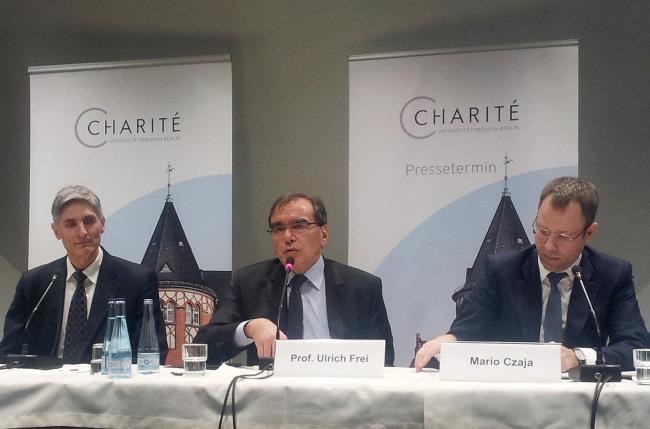A South Korean medic exposed to the Ebola virus while treating a patient in West Africa tested negative in an initial blood test, Berlin municipal officials said on Sunday.
But the health worker will be monitored for at least three more weeks in Germany to ensure the virus is not in incubation, the officials added. Experts believe the Ebola virus can stay dormant in the human body for up to 21 days. The South Korean has not yet shown symptoms of infection.
The health worker had been dispatched by South Korea to Sierra Leone, to join a British team treating local patients there. The South Korean may have contracted the virus last Monday while treating a patient.

Berlin city officials and doctors announce Saturday at the city’s Charite hospital that a South Korean health worker who was taken to Germany with a suspected Ebola infection after volunteering in the Republic of Sierra Leone has tested negative for the virus. (Yonhap)
The health worker was flown to Berlin, Germany on Saturday for possible treatment and monitoring and not to Seoul, in order to protect the patient’s anonymity. Officials have not disclosed the medic’s gender, age or profession.
“First of all it’s good from a transportation point of view to come here and secondly it’s better for the person’s anonymity to be treated here in Europe,” Dr. Frank Bergmann, the official overseeing infectious patients said at the Charite hospital in Berlin on Saturday.
The South Korean health worker was using a hypodermic needle to draw blood from a patient when the patient reportedly jolted, causing the needle to penetrate the South Korean medic’s protective gloves. The syringe apparently contained the local patient’s blood.
“The patient had a very high viral load and died the next day, which means that there was a very high risk of infection,” Bergmann said.
The South Korean is under quarantine at the Berlin hospital.
Medical officials appear optimistic though. The South Korean is taking the situation well in a professional way, Bergmann said. The doctor added that there have been multiple cases of high-risk exposure health workers turning out not to have been infected.
A U.S. doctor exposed to Ebola through a needlestick injury was released in October last year after a medical team at the U.S.-based National Institutes of Health monitored him for a few weeks.
Close to 8,000 confirmed, probable and suspected cases of death due to the latest Ebola virus outbreak have been reported, according to the World Health Organization. The disease can be transferred through contact with the blood, sweat, saliva, or other bodily fluids of an infected patient.
By Jeong Hunny (hj257@heraldcorp.com)



![[Weekender] How DDP emerged as an icon of Seoul](http://res.heraldm.com/phpwas/restmb_idxmake.php?idx=645&simg=/content/image/2024/04/25/20240425050915_0.jpg&u=)


